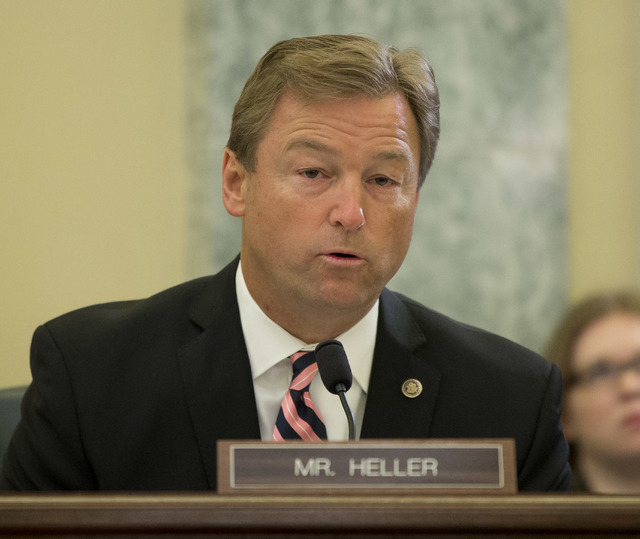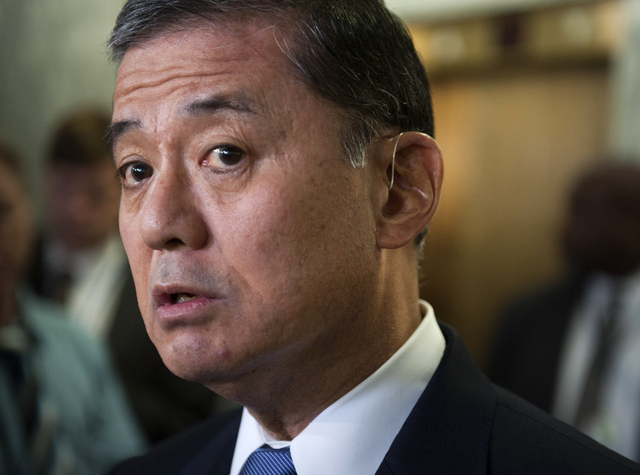Heller calls for VA secretary to resign, citing Phoenix hospital problems
WASHINGTON — Sen. Dean Heller added his voice Wednesday to a growing chorus for the resignation of VA Secretary Eric Shinseki, saying an investigation confirming patient appointments were manipulated at the troubled agency’s hospital in Phoenix was the final straw.
About 1,700 veterans in need of care were “at risk of being lost or forgotten” after being kept off the official waiting list at the veterans hospital in Arizona, the Veterans Affairs watchdog said in a scathing report.
The investigation, initially focused on the Phoenix hospital, found systemic problems in the VA’s sprawling nationwide system, which provides medical care to about 6.5 million veterans each year.
Richard J. Griffin, the department’s acting inspector general, said 42 centers are under investigation, up from 26.
Heller, who sits on the Senate Committee on Veterans Affairs, had criticized VA’s performance in Nevada but had stopped short of calling for Shinseki’s departure. But following release of the blockbuster audit the Nevada Republican said, “It is time for a leadership change at the VA at the highest level.”
“The Department of Veterans Affairs Inspector General’s report provides a very disturbing view of what has been confirmed as a systemic problem at the VA,” Heller said in a statement. “I have great respect for Secretary Shinseki’s service to our nation and the sacrifices he has made, but the problems within the department for which he is responsible cannot be ignored.”
Investigators concluded 1,700 Phoenix patients were put on unofficial lists that kept them waiting for treatment for as many as 115 days.
Investigators said tampering with the facility’s electronic scheduling system was a way to mask long delays for patient treatment that hampered job performance reviews and bonuses. Whistle-blowers have said 40 patients died while waiting for care. Griffin said he has found no evidence so far that any of those deaths were caused by delays.
Sens. John McCain and Jeff Flake, both R-Ariz., called for Shinseki to leave. Sens. Mark Udall of Colorado, Kay Hagan of North Carolina and John Walsh of Montana became the first incumbent Democrats up for election to also call for his departure.
Sen. Harry Reid, D-Nev., the Senate majority leader, remained silent, a day after telling a reporter in Las Vegas that “yes” he was still sticking by Shinseki. Reid has called the VA leader a good man whose departure would not hasten improvement at the troubled agency.
The agency leader is a retired four-star general who lost his leg during combat in Vietnam and has been credited with overseeing improvements in dispensing education benefits, veteran homelessness and reducing — to some extent — record backlogs in processing disability claims from soldiers returning from Iraq and Afghanistan.
But Shinseki’s support on Capitol Hill got swamped after the inspector general said the problems in Phoenix were “systemic” within the agency.
The VA said it will not disclose which medical centers are being investigated, in order to deter any destruction of records that was alleged to take place at the Phoenix hospital.
Managers of the VA Southern Nevada Healthcare System, whose centerpiece is the medical center in North Las Vegas, have insisted they do not cook the books on patient scheduling and no evidence of that has surfaced. They readily concede that veterans face long waits for appointments for a range of services at the hospital that opened in August 2012.
Rep. Dina Titus, D-Nev., asked Griffin on Wednesday to include the Southern Nevada facility among those to be investigated. In a “trust but verify” move, Titus has received no evidence of problems but wants to make sure, her spokeswoman said.
Similarly, at a visit to the North Las Vegas hospital on Tuesday, Rep. Steven Horsford, D-Nev., was told there were no questionable scheduling practices. Horsford “will review the independent audit and investigation report to ensure that this is the case,” his spokesman said.
Heller had been among senators willing to give Shinseki the benefit of the doubt, at least for a while. The Nevadan argued that problems such as the nation’s-worst disability claim rate at the regional office in Reno were more local problems that could be fixed by Washington — until they were not.
On the CNN “Crossfire” show May 21, Heller complained that the agency’s regional director in Reno would not return his phone calls, or those from other Nevada lawmakers. Tuesday, the Nevadan complained to Shinseki in a letter that he had not yet received answers to questions about the status of services in Nevada that he posed at a Senate hearing May 8.
Shinseki called the IG’s findings “reprehensible to me, to this department and to veterans.” He said he was directing the Phoenix VA to immediately address each of the 1,700 veterans waiting for appointments.
VA guidelines say veterans should be seen within 14 days of their desired date for a primary care appointment. Lawmakers have called that target unrealistic and said basing employee bonuses and pay raises on it is outrageous. The 14-day waiting period encourages employees to “game” the appointment system in order to collect bonuses based on on-time performance, the IG report said.
The inspector general described a process in which schedulers ignored the date that a provider or veteran wanted for an appointment. Instead, the scheduler selected the next available appointment and used that as the purported desired date.
The IG’s report said problems identified by investigators were not new. The IG’s office has issued 18 reports to George W. Bush and Obama administrations as well as Congress since 2005.
Griffin said investigators’ next steps include determining whether names of veterans awaiting care were purposely omitted from electronic waiting lists and at whose direction and whether any deaths were related to delays in care.
He said investigators at some of the 42 facilities “have identified instances of manipulation of VA data that distort the legitimacy of reported waiting times.” The IG said investigators are making surprise visits, a step that could reduce “the risk of destruction of evidence, manipulation of data, and coaching staff on how to respond to our interview questions.”
Justice Department officials have already been brought into cases where there is evidence of a criminal or civil violation, Griffin said.
The Associated Press contributed to this report. Contact Stephens Washington Bureau Chief Steve Tetreault at stetreault@stephensmedia.com or 202-783-1760. Find him on Twitter: @STetreaultDC.
<img src="https://www.reviewjournal.com/sites/default/files/styles/small/public/field/media/web1_1412075-a779dba5efd54e47acf301e0b2f6fd28.jpg?itok=n_Za0QnJ
">
115-day wait
A first appointment at the VA hospital in Phoenix had an average wait time of 115 days..


















